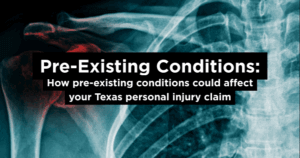
Understanding how pre-existing injuries impact personal injury cases under Texas law, including the eggshell plaintiff rule.
When you suffer an injury in Texas due to someone else’s negligence, you have the right to seek compensation, even if you had a pre-existing condition. However, insurance companies often use your prior medical history to limit or deny your claim. This is where Texas law and the “eggshell plaintiff” rule come into play.
Understanding Pre-Existing Conditions in Personal Injury Claims
A pre-existing condition refers to any medical issue or injury you had before the accident. Common examples include:
- Back or neck problems
- Arthritis
- Previous surgeries
- Degenerative disc disease
- Old fractures or soft tissue injuries
When a new accident aggravates or exacerbates these conditions, questions often arise about how much of your current injury is due to the new incident versus your prior health issues.
The Eggshell Plaintiff Rule in Texas
Under Texas law, the “eggshell plaintiff” rule protects injured victims who have pre-existing conditions. This rule is derived from common law principles and is routinely recognized by Texas courts.
The Texas Pattern Jury Charge (PJC 28.6) includes specific language on pre-existing conditions: “If a pre-existing injury or condition was aggravated by the occurrence in question, you are to determine the amount of damages that resulted from the aggravation.”
Simply put, under the eggshell plaintiff rule, a defendant takes the plaintiff as they find them. If the defendant’s negligence causes additional harm to someone who is more susceptible to injury due to a pre-existing condition, they are still fully responsible for the entire extent of the harm caused.
Insurance Companies’ Tactics
Despite the eggshell plaintiff rule, insurance companies routinely argue that your injuries were not caused by the accident but were instead due to your pre-existing conditions. Their tactics often include:
- Requesting extensive medical records
- Hiring defense medical experts
- Arguing that only a minor aggravation occurred
- Blaming natural degeneration or aging
These arguments can significantly reduce your settlement offer if you don’t have strong legal advocacy.
Texas Law: Proximate Cause and Apportionment of Damages
In Texas, the legal concept of “proximate cause” is crucial (Texas Pattern Jury Charge PJC 2.4). The defendant is liable for injuries that are the foreseeable result of their negligence, even if the plaintiff’s pre-existing condition made the injuries worse.
However, if part of your injury was truly unrelated to the accident, the jury may apportion damages. Texas Civil Practice and Remedies Code §33.003 allows for proportionate responsibility, though this typically applies to multiple defendants rather than distinguishing between pre-existing and new injuries.
In Leitch v. Hornsby, 935 S.W.2d 114 (Tex. 1996), the Texas Supreme Court reaffirmed that defendants are liable for the full extent of harm caused by their negligence, even when pre-existing conditions make the injury worse.
Key Takeaways for Injured Texans
- You are entitled to compensation for the full extent of your injuries, even if you had a pre-existing condition.
- The defendant cannot escape liability by arguing you were already vulnerable.
- Insurance companies will likely try to minimize your claim by focusing on your medical history.
- Having thorough medical documentation and an experienced personal injury attorney can make a significant difference.
Protecting Your Rights
If you have suffered a pre-existing injury accident in Texas, don’t let insurance companies take advantage of you. An experienced personal injury attorney can:
- Gather and present your medical evidence effectively.
- Retain medical experts to support your case.
- Ensure the jury understands how the accident aggravated your pre-existing condition.
- Maximize your compensation under Texas law.
At the HLAW Firm, we have extensive experience dealing with complex cases involving pre-existing injuries.Contact us for a free consultation if you or a loved one has been injured.










